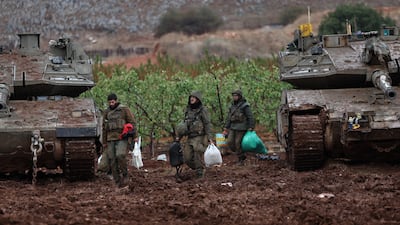Live updates: Follow the latest on Israel-Gaza
Israel and Lebanon reached a ceasefire agreement to end the devastating conflict with Hezbollah, after more than a year of cross-border clashes escalated into full-scale war over the past three months.
The truce is expected to halt Israel's ground invasion and air strikes, as well as Hezbollah's attacks on Israel. The National has obtained the final version, which was discussed in a Lebanese government meeting on Wednesday. So what's in it?
The ceasefire
From Wednesday morning forward, the Lebanese government will have to “prevent Hezbollah” fighters and all other armed groups in the country from carrying out any operations against Israel, and Israel will not carry out any offensive military operations against Lebanese targets, including civilian, military or other state targets, in the territory of Lebanon, by land, air or sea.
These commitments “do not preclude either Israel or Lebanon from exercising their inherent right of self-defence, consistent with international law,” according to the text.
Negotiations entered their critical stage last week, with the main point of contention being the interpretation of a clause on “self-defence”, sources told The National.
Officials in Lebanon firmly rejected any clause that Israel could use to breach Lebanese sovereignty, including its airspace, as it has done in recent years. Senior Israeli officials have demanded the right to act against Hezbollah even if a ceasefire is agreed.
The solution that was proposed to address the issue was for Israel to be able to lodge complaints with a US-led committee, which would then relay them to the Lebanese Army and UN peacekeepers and set a deadline for action before Israel could intervene.
Upon the commencement of the cessation of hostilities, Israel will withdraw its forces in a phased manner south of the Blue Line, which should not exceed 60 days, and in parallel the Lebanese armed forces will deploy to positions in the southern Litani area.
The Army
Lebanon's official military and security forces, infrastructure and weaponry will be the only armed groups, arms and related materiel deployed in the southern Litani area.
And in order to prevent the re-establishment and rearmament of non-state armed groups in Lebanon, any sales or supply of arms and related materiel into Lebanon will be regulated and controlled by the government. Additionally, all production of arms and related materiel within Lebanon will be regulated and controlled by the government.
Lebanon's official military and security forces will have to monitor and enforce against any unauthorised entry of arms and related materiel into and throughout Lebanon; dismantle all existing unauthorised facilities involved in the production of arms and related materiel, and prevent the establishment of such facilities in the future; dismantle all infrastructure and military positions, and confiscate all unauthorised arms inconsistent with these commitments.
The US and France intend to work to enable and achieve a total deployment of 10,000 Lebanese soldiers to southern Lebanon as soon as possible. Further, the US and France will work with the international community to support the army as appropriate to achieve such an increase in its deployment levels in Lebanon, and to improve its capabilities.
The committee
To ensure the ceasefire is observed, Israel, Lebanon and the US will establish an “independent monitoring and enforcement mechanism”. This would take the form of a US-led committee including UN peacekeepers and representatives of Israel, Lebanon and France.
The committee, hosted by Unifil, chaired by the US, and including France, will monitor, verify, and assist in ensuring enforcement of the commitments. Israel and Lebanon will co-operate with and facilitate their work.
“Alongside the Mechanism's work, Unifil's work pursuant to its mandate will continue, including the efforts Unifil supports through its convening role that enhance the Mechanism's effectiveness,” read the document.
“Israel and Lebanon will report any alleged violations to the Mechanism and Unifil without prejudice to their respective rights to communicate directly with the UN Security Council. The Mechanism will develop appropriate procedures to consult, inspect, gather information, and assist in ensuring the enforcement of these commitments.”

